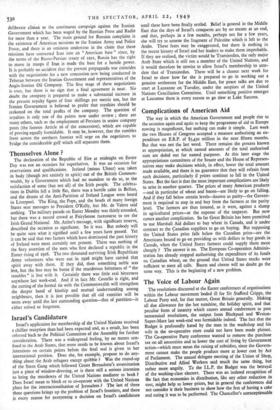Themselves Alone ?
The declaration of the Republic of Eire at midnight on Easter Day was not an occasion for superlatives. It was an occasion for reservations and qualifications. Ireland (minus Ulster) was taken in body (though not entirely in spirit) out of the British Common- wealth, by a Government which had no mandate to do so, to the satisfaction of some (but not all) of the Irish people. The celebra- tions in Dublin fell a little flat, there was a hostile calm in Belfast, and the drums of the Anti-Partition of Ireland League were heard in Liverpool. The King, the Pope, and the heads of many foreign States sent messages to President O'Kelly, but Mr. de Valera said nothing. The military parade on Easter Monday was thinly attended, but there was a record crowd at Fairyhouse racecourse to see the Irish Grand National. Mr. Attlee's message, with significant reserve, described the occasion as significant. So it was. But nobody will be quite sure what it signified until a few years have passed. Yet it can be said that two factors which have dominated the past history of Ireland were most certainly not present. There was nothing of the fiery assertion of the men who first declared a republic in the Easter rising of 1916. The two thousand surviving Irish Republican Army volunteers who were out in 1916 might have carried that spirit away with them. If they did, then something noble was lost, but the loss may be borne if the murderous bitterness of " the troubles " is lost with it. Certainly there was little real bitterness anywhere last week-end. And if in fact Mr. Costello is right, and the cutting of the formal tie with the Commonwealth will strengthen the deeper bond of kinship and mutual understanding among neighbours, then it is just possible that all old enmities will be worn away until the last outstanding question—that of partition—is either solved or forgotten.


































 Previous page
Previous page